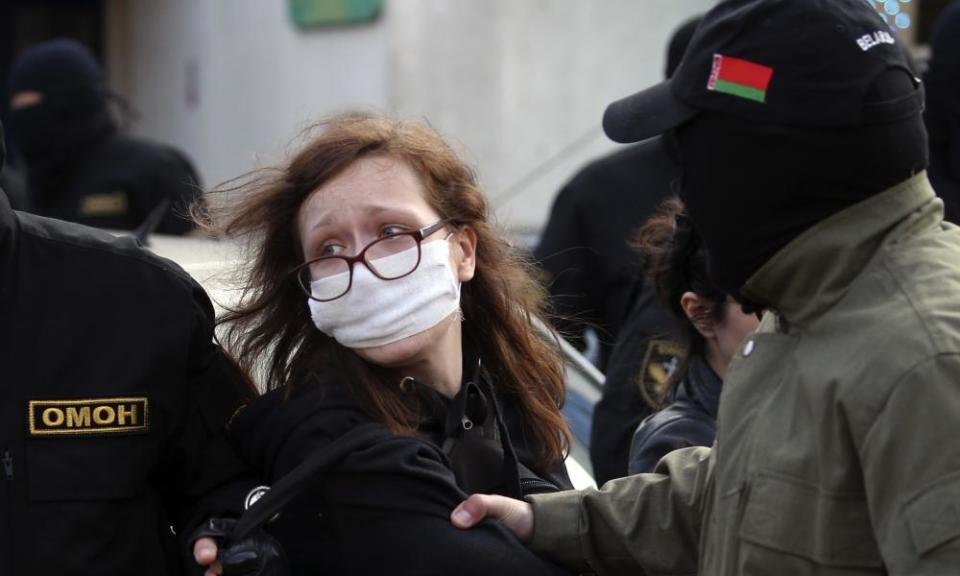'We raised £2m in days': the donations helping protesters in Belarus

When riot police started beating up protesters in Belarus after contested elections in August, thousands of locals responded by doing the only thing they felt might help make a difference in the face of police violence and impunity: making donations.
Alexey Leonchik, a 38-year-old Belarusian based between London and Warsaw, had set up a project three years ago called BY_help, which was meant to help pay the fines of people arrested in Belarus. Back then, it raised a few thousand pounds. But as the horrific footage began to come out of the country in the aftermath of election night, the money started coming in to his Facebook fundraiser like never before.
“We got £500,000 within four hours. A few days later there was more than £2m,” said Leonchik in an interview in London. Most of the money came from Belarusians, either inside the country or in the diaspora. The roughly 69,000 donations were mostly for small amounts, with the largest single donation from Russian artist Artem Loskutov, who sold a painting for 1.5m roubles (£15,470) and donated the proceeds.
Leonchik and a quickly expanding team of volunteers promised to use the funds either to help protesters with fines or as compensation for those who received injuries at the hands of the riot police. About 3,500 people have applied for help so far, and their claims are checked by a team of 40 volunteers, who request supporting documents and ask questions to determine the severity of the claim.
For fines, people simply need to attach their court documents and will immediately receive payment, while for injuries, the volunteers grade the severity on a four-point scale, with the lowest payout around £400 and the highest at £3,500. The payments can be used for whatever purpose the recipient wishes. For people with really serious injuries, there may be a discretionary payment of up to £10,000.

The money has come in faster than the team can give it away. So far, they have made donations of about £350,000. In a sign of how quickly the project has grown, Leonchik explained that the decision on the gradations of payment was taken by a group of six people involved in the project who spent an hour on a WhatsApp call and fixed the amounts on a fairly ad hoc basis. “If there is doubt the rule is that you go one rung up,” he said.
The success of the fund is just one more sign of how large parts of the country have come together in solidarity in opposition to the autocratic regime of Alexander Lukashenko. Businesses targeted by his thuggish riot police have seen a surge in clients, while better off Belarusians have tried to help their compatriots financially.
A parallel fundraising drive, called Belarus Solidarity, has collected money to compensate people who have lost their jobs because they went on strike in support of protests, or decided to resign. One former policeman said the funds had proved extremely useful after he decided to quit the force in the wake of the first wave of violence in August.
“My cousin suffered illegal abuse from the police (my colleagues) on 11 August, when he was detained for no reason in Minsk and imprisoned, where he was subjected to torture and had a rib broken,” said the former policeman, who asked to remain anonymous due to fear of retribution. “After this and a lot of other things going on in Belarus, I felt I could no longer serve in the police.”
However, to break his contract early, he was forced to pay a fine of 6,000 Belarusian roubles (£1,823). He applied for support to Belarus Solidarity and “after a few quick enquiries” was granted funds of €1,500 to help cover the expense, he said.
Recently, another new foundation has been set up specifically to help media in Belarus, as authorities go after independent journalists with arrests and threats. “People asked BY_help if there was a way to help journalists specifically, so we set up this fund,” said the coordinator, a former journalist who asked to remain anonymous. The fund has raised about €50,000 in two weeks, and has already provided grants to three regional newsrooms to keep on with their work, as well as relocation assistance to six journalists who felt under threat and wanted to leave the country.
With such a rough and ready system, there are inevitably a few fraudulent claims for compensation. “So far we only had about five obvious frauds and ten more attempts to make things look a bit more serious than they were,” said Leonchik. He said the volunteers had become skilled in understanding the signs of people who had suffered in the prisons, and that detailed doctors’ reports were often helpful to determining injuries. He conceded that possibly some fraudulent claims had slipped through the net but said it did not bother him much.
“When you have 3,500 people waiting in line it doesn’t make sense to spend ages looking at a dozen fraud cases. Call it operational loss,” he said.

